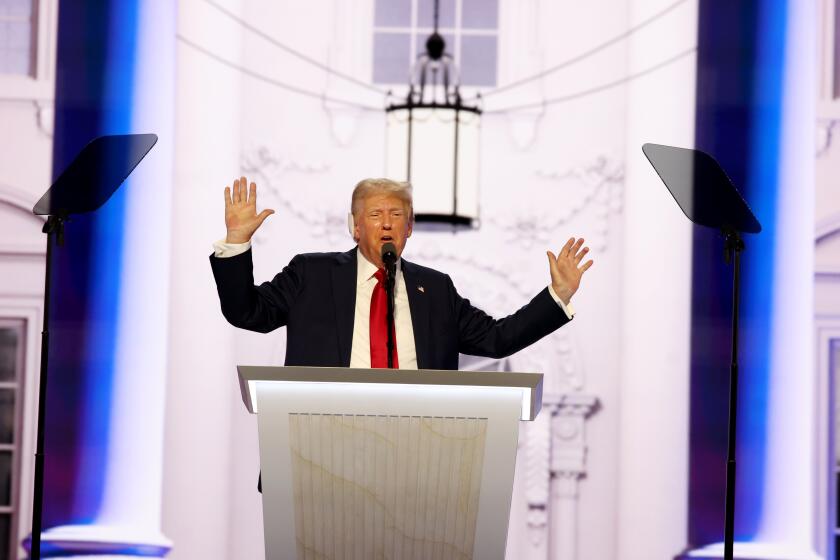Senate’s Spending Plan Goes Billions Over Budget
Economists and conservative politicians have long warned that government deficits, if left to accumulate year after year, would ultimately damage the nation’s economy.
The budget passed by the Senate on Thursday night seemed designed to put that theory to the test.
The Senate’s action emerged Friday as a budget-buster of multibillion-dollar proportions. Over the next five years, the budget approved by the Senate was estimated to result in deficits of $1.45 trillion -- $217 billion more than if Congress made no changes in current spending and tax policy.
Fully $87 billion of that red ink was added on the Senate floor Thursday night, mostly in a tax cut supported by 50 of the Senate’s 55 Republicans, as the Senate voted on amendment after amendment on the way to final passage of the blueprint for federal spending.
“It doesn’t send a very hopeful message to anybody who cares about deficits,” said Robert L. Bixby, executive director of the Concord Coalition and one of Washington’s leading deficit hawks.
The Senate budget is not the last word, but the House has already approved a budget containing almost as much red ink as the Senate version.
Though the House approved its plan in a more orderly fashion Thursday, avoiding a flood of last-minute tinkering and amendments, its budget projects deficits over the next five years of about $1.36 trillion.
The chief difference between the House and Senate budget plans was not the size of the projected deficits. It was in which programs they would cut and which tax breaks they would provide.
Bixby said that the House and Senate would probably be able to forge a compromise between their two versions of the budget, but he said it was no sure thing.
The White House also held out hope of a deal reconciling the two bills.
“We think we can get a good budget” from the House-Senate committee that will be appointed to work out a compromise, presidential spokesman Trent Duffy said.
Noam Neusner, a spokesman for the White House Office of Management and Budget, said that both the House and the Senate versions of the budget represented “important steps forward to meet the president’s goals -- in particular spending restraint.”
But the Senate action, although pleasing those who had lobbied against cuts in specific programs such as Medicaid and the global fight against AIDS, was denounced by analysts who seek less government spending and smaller deficits.
“The Senate punted most of the tough spending issues down the road,” said Brian Riedl, a budget analyst with the conservative Heritage Foundation.
His Exhibit A: the Senate’s passage, 52 to 48, of an amendment to eliminate a proposed $14-billion Medicaid cut and establish a commission to study the program’s future. The cut the senators voted down would have reduced Medicaid’s projected growth over the next five years from 41% to 39%.
Sen. Gordon H. Smith (R-Ore.), the amendment’s chief author, said he could probably support a compromise with the House that included a Medicaid spending cut of less than $14 billion. “We have to have a budget, or we have chaos in Congress,” Smith said.
The Senate also voted $2 billion to restore community development block grants to their current level. Although Congress could still make this cut in an appropriations bill, Riedl said the budget vote “was a signal that the Senate is not ready to address even the most wasteful programs.”
Liberals were most outraged by a 55-45 vote for a proposal by Sen. Jim Bunning (R-Ky.) to reduce from 85% to 50% the maximum amount of Social Security benefits subject to income tax.
The Bunning amendment would provide the wealthiest 25% of Social Security beneficiaries -- couples making more than $44,000 and individuals making more than $34,000 -- with a tax break that would cost the Treasury $64 billion in reduced revenue over five years. It passed with the support of 50 Republicans -- including Budget Committee Chairman Judd Gregg of New Hampshire -- and five Democrats.
“The senators who decried the deficit increase in the Medicaid amendment turned around and added four times as much to the deficit with this tax cut,” said James Horney, a senior fellow at the Center for Budget and Policy Priorities, a liberal research group.
If Congress fails to adopt a budget, as it did last year, that could make it harder to rein in the individual spending and tax bills that Congress will adopt in the coming months.
The budget forces Congress to reconcile outlays and revenue within an overall cap on red ink. Reconciliation bills cannot be filibustered in the Senate.
The Senate’s version of the budget would instruct the Senate Energy and Natural Resources Committee to prepare legislation opening part of the Arctic National Wildlife Refuge to oil and gas drilling. The budget legislation would be exempt from a filibuster, which Democrats have used to kill Arctic drilling measures in the past.
More to Read
Get the L.A. Times Politics newsletter
Deeply reported insights into legislation, politics and policy from Sacramento, Washington and beyond. In your inbox three times per week.
You may occasionally receive promotional content from the Los Angeles Times.










